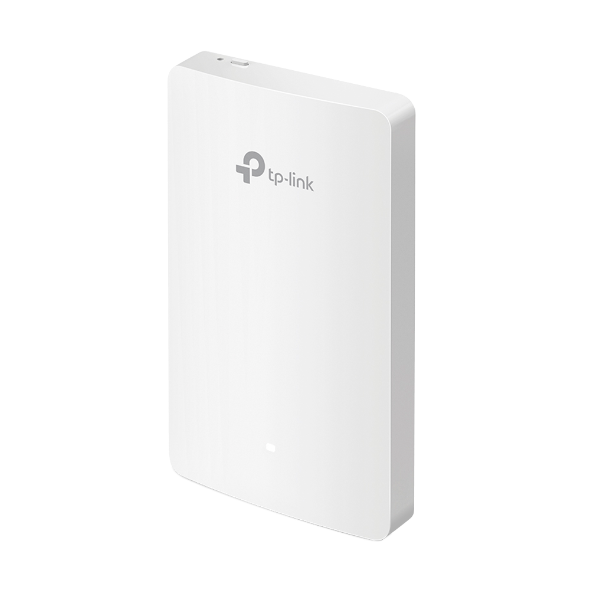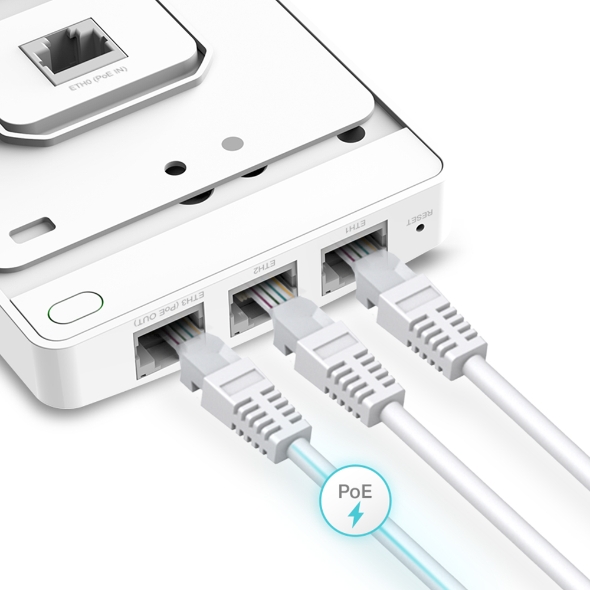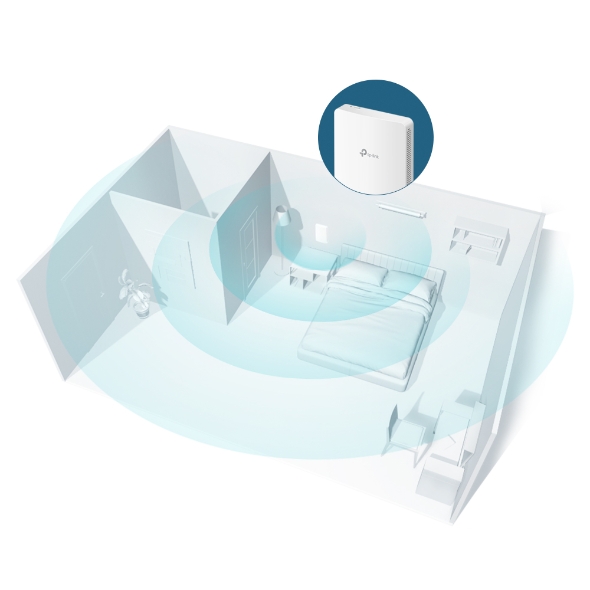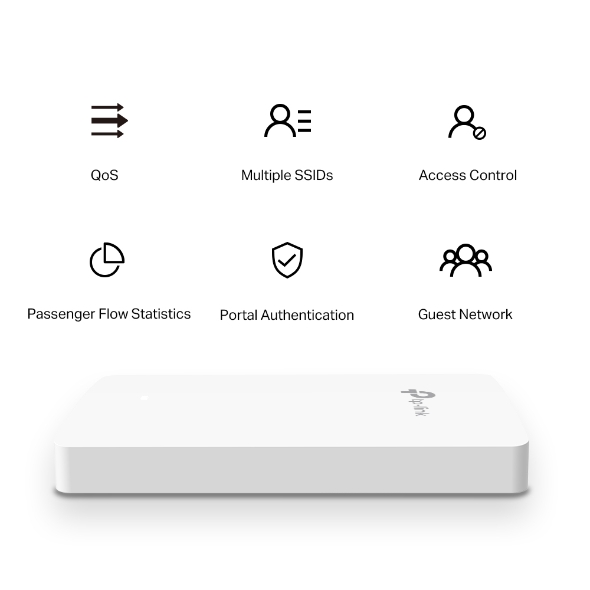EAP235-Wall
Omada AC1200 Wireless MU-MIMO Gigabit Wall Plate Access Point
- Elegant Appearance: 15 mm ultra slimmest and conspicuous design blends into hotel rooms, hospitals, offices, dormitories and any other environments
- Easy Installation and PoE-enabled: Easy-mount construction allows effortless installation into standard EU/US wall junction box and PoE compatibility helps for flexible deployment
- Interface: 4 Gigabit Ethernet ports (1*uplink + 3*downlink), with one downlink port supporting PoE pass-through to provide power for wired device
- High Capacity: Dual-Band 802.11ac Wave 2 with 2x2 MU-MIMO provides wireless speeds of up to 1,200 Mbps and great compatibility to connect varieties of devices
- Cloud management and Omada app supported for ultra-convenience and easy management
- Enterprise class Wi-Fi security helps to decrease network security threats
- Secure guest network along with Facebook Wi-Fi/SMS authentication options and wireless security technology
11ac Wi-Fi for the Best Room-by-Room Connection
 EAP235-Wall
EAP235-Wall
Dedicated Complete, Private Wi-Fi Network in Each Room
An EAP in each room allows guests to enjoy their own private Wi-Fi network that’s fast, delivering a strong signal, and providing corner to corner coverage.
MU-MIMO + Dual-Band: Connect Faster and More
802.11ac wave 2 MU-MIMO technology enables multiple users to access the Internet simultaneously, which largely boosts up your network speed of up to 1,200 Mbps. Capable of transmitting in both 2.4 GHz and 5 GHz wireless band, it provides greater compatibility to connect varieties of devices.
- 5 GHz 867 Mbps
- 2.4 GHz 300 Mbps
With MU-MIMO
Without MU-MIMO
Absolute Thinnest, Inconspicuous Design
The thinnest wall plate AP available—only 15 mm—featuring a sleek, minimalist appearance. Designed to blend in with the décor of hotel rooms, hospitals, offices and school dormitories, to deliver powerful Wi-Fi without clashing with the room.
-
EAP235-Wall
-
Traditional
Effortless Deployment with PoE Powered
With 802.3af/802.3at Power over Ethernet supported there’s no need to install additional wiring in the building. Simply plug in existing Ethernet cables and you’re ready to go.
Quick, Simplified Installation
EAP235-Wall is easy to install, so extra cost, time, or professional knowledge are completely unnecessary.
*Fits three kinds of wall junctions
-
86 mm wall junction box
-
Standard EU wall junction box
-
Standard US wall junction box
Full Gigabit Ports to Bridge Network
Equipped with four Gigabit data ports (1*uplink + 3*downlink), one downlink port offering PoE pass-through, to connect multiple devices to your gigabit network. Wired devices like VoIP phones can be powered with no need for extra electrical cables.
- VoIP Phone
- printer
Cloud Centralized Management Anytime, Anywhere
Omada Hardware Controller OC200 and Omada Software Controller make it easy to manage and monitor the whole Omada network in real-time, while cloud service enables remote and secure access no matter where you find yourself.
Easy Management with the Omada App
Follow configuration instructions on the Omada app to get set up in minutes. Omada lets you configure settings, monitor the network status and manage clients, all from the convenience of a smart phone or tablet.
| HARDWARE FEATURES | |
|---|---|
| Interface | • Uplink: 1× 10/100/1000 Mbps Ethernet Port• Downlink: 3× 10/100/1000 Mbps Ethernet Ports (One port supports PoE OUT. The PoE OUT feature requires 802.3at PoE+ input and the maximum output is 13 W.) |
| Physical Security Lock | Yes |
| Button | Reset |
| Power Supply | 802.3af/802.3at PoE |
| Power Consumption | 9.8 watts /24.4 watts (PoE Out Included) |
| Dimensions ( W x D x H ) | 143 × 86 × 20 mm (5.6 × 3.4 × 0.8 in) |
| Antenna | 2 Dual-Band Antennas• 2.4 GHz: 2× 4 dBi• 5 GHz: 2× 4 dBi |
| Mounting | Wall Plate Mounting |
| WIRELESS FEATURES | |
|---|---|
| Coverage | 25㎡(300 ft²)*** |
| Wireless Client Capacity | 200+** |
| Concurrent Clients | 200+** |
| Wireless Standards | IEEE 802.11a/b/g/n/ac |
| Frequency | 2.4 GHz and 5 GHz |
| Signal Rate | • 5 GHz: Up to 867 Mbps• 2.4 GHz: Up to 300 Mbps |
| Wireless Functions | • 16 SSIDs (Up to 8 SSIDs on each band)• Enable/Disable Wireless Radio• Automatic Channel Assignment• Transmit Power Control (Adjust Transmit Power on dBm)• QoS(WMM)• MU-MIMO• Band Steering• Beamforming• Load Balance• Rate Limit• Reboot Schedule• Wireless Schedule• Wireless Statistics based on SSID/AP/Client |
| Wireless Security | • Captive Portal Authentication• Access Control• Wireless Mac Address Filtering• Wireless Isolation Between Clients• SSID to VLAN Mapping• Local LAN port based VLAN• Rogue AP Detection• 802.1X Support• 64/128/152-bit WEP, WPA/WPA2-PSK, WPA/WPA2-Enterprise |
| Transmission Power | • CE:≤20 dBm (2.4 GHz, EIRP)≤23 dBm (5 GHz, EIRP)• FCC:≤21 dBm (2.4 GHz)≤21 dBm (5 GHz) |
| MANAGEMENT | |
|---|---|
| Omada App | Yes |
| Centralized Management | • Omada Cloud-Based Controller• Omada Hardware Controller (OC300)• Omada Hardware Controller (OC200)• Omada Software Controller |
| Cloud Access | Yes. Requiring the use of OC300, OC200, Omada Cloud-Based Controller, or Omada Software Controller. |
| Email Alerts | Yes |
| LED ON/OFF Control | Yes |
| Management MAC Access Control | Yes |
| SNMP | v1,v2c |
| System Logging Local/Remote Syslog | Local/Remote Syslog |
| SSH | Yes |
| Web-based Management | HTTP/HTTPS |
| L3 Management | Yes |
| Multi-site Management | Yes |
| Management VLAN | Yes |
| Zero-Touch Provisioning | Yes. Requiring the use of Omada Cloud-Based Controller. |
| OTHERS | |
|---|---|
| Certification | CE, FCC, RoHS |
| Package Contents | • Omada AC1200 Wireless MU-MIMO Gigabit Wall Plate Access Point EAP235-Wall• Installation Guide• Mounting Screw |
| System Requirements | Microsoft Windows XP, Vista, Windows 7, Windows 8, Windows 10, Windows 11, Linux |
| Environment | • Operating Temperature: 0–40 ℃ (32–104 ℉)• Storage Temperature: -40–70 ℃ (-40–158 ℉)• Operating Humidity: 10–90% RH non-condensing• Storage Humidity: 5–90% RH non-condensing |
*Maximum wireless signal rates are the physical rates derived from IEEE Standard 802.11 specifications. Actual wireless data throughput and wireless coverage are not guaranteed and will vary as a result of 1) environmental factors, including building materials, physical objects, and obstacles, 2) network conditions, including local interference, volume and density of traffic, product location, network complexity, and network overhead, and 3) client limitations, including rated performance, location, connection, quality, and client condition.






















